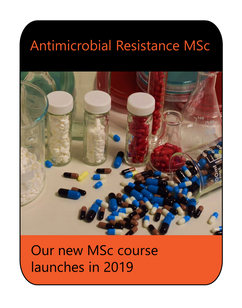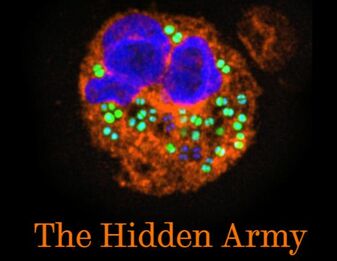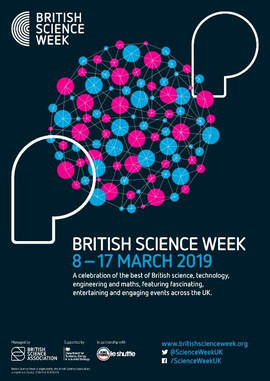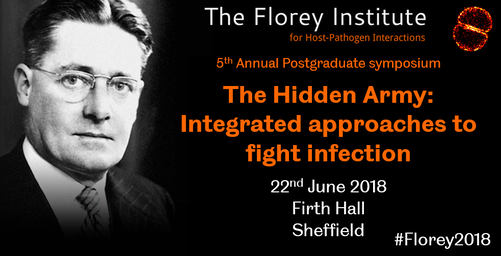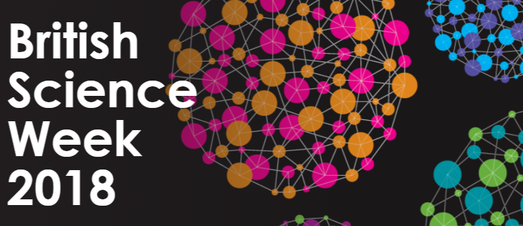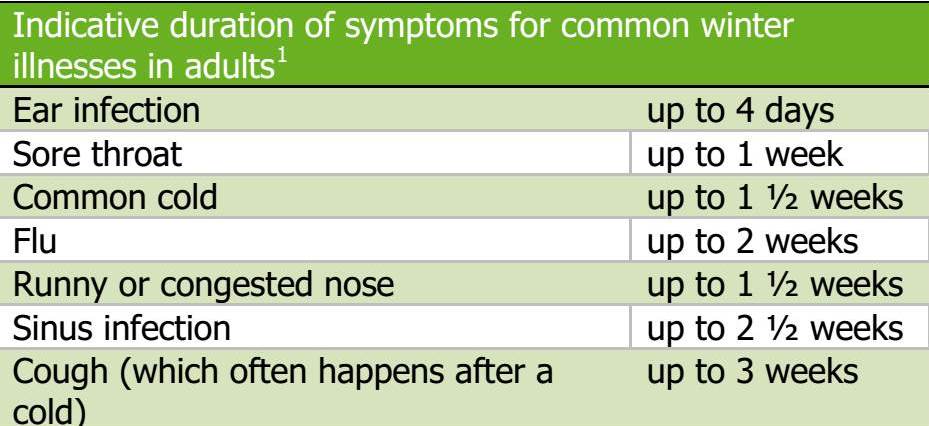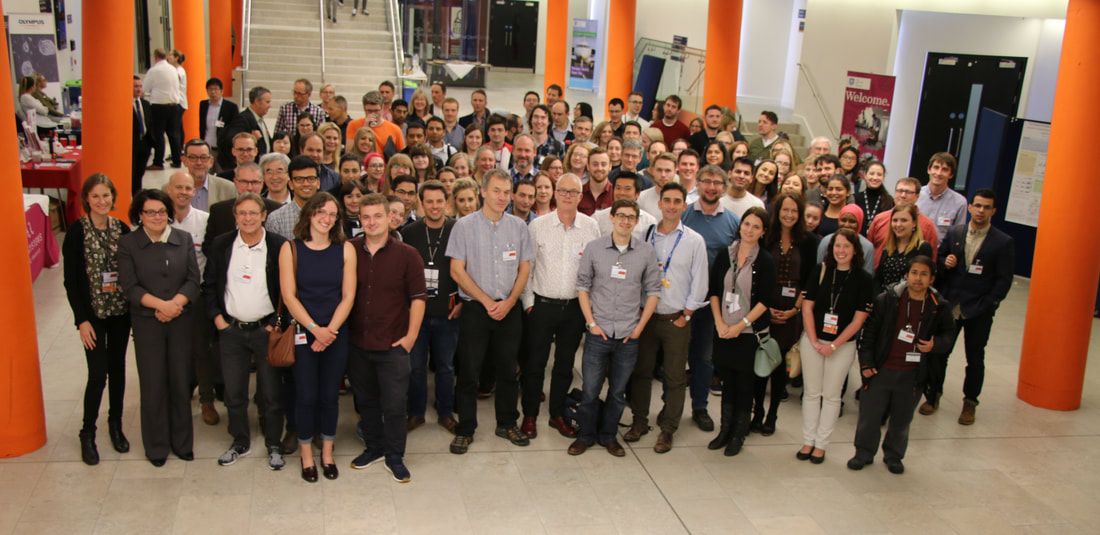|
Past Events
|
2021
|
Florey Institute Symposium and StaphGBI - virtual event
The Florey Institute Postgraduate Symposium and Staph GBI virtual event Learn more about this event HERE. Follow the event on twitter: #StaphGBI2021 #Florey2021 |
2020
Our programme includes both keynote and short talks exemplifying existing and potential infection collaborations across the Univerity of Sheffield and Sheffield Teaching Hospitals, round table break out workshops, and plenty of time to meet and share.
The Florey Institute was proud to host the following keynote speakers:
The Florey Institute was proud to host the following keynote speakers:
Together with an exiting Event Programme of speakers in basic research and healthcare.
2019
|
The Florey Insitute launches the
Hosted by the University of Sheffield and supported by the NHS, this MSc programme has been designed to train the healthcare workers, policy makers and scientists of tomorrow. For more inforamtion about this course please
CLICK HERE. |
The Florey Institute Research Forum (FIRF) - Meeting Dates 2019
Our research forum includes talks from our student cohort and guest speakers.
Our research forum includes talks from our student cohort and guest speakers.
|
21/01/2019
06/03/2019 15/04/2019 29/05/2019 08/07/2019 |
(Monday)
(Wednesday) (Monday) (Wednesday) (Monday) |
14:00-15:00
14:00-15:00 14:00-15:00 14:00-15:00 14:00-15:00 |
LT01- Arts Tower
G2 - Firth Court LT01- Arts Tower LT03 - Med School G2 - Firth Court |
|
The Florey Institute's
6th Annual Postgraduate Symposium The Hidden Army:
Integrated approaches to fight infection 28th June 2019, Firth Hall, University of Sheffield Find out more here
Follow on twitter at: #Florey 2019 |
Florey Institute Seminar Series (2018-19)
We are delighted to welcome Dr Siobhán O’Brien from the University of Liverpool who will give our next Florey Seminar.
Dr O'Brien's lab studies, cystic fibrosis which is a fatal genetic disorder where patients are predisposed to lifelong lung infections. The most common cause of mortality in cystic fibrosis patients is chronic infection with Pseudomonas aeruginosa, an antibiotic-resistant, virulent pathogen that is virtually impossible to eradicate once established. There is currently no cure for cystic fibrosis, and it remains the most common fatal genetic disease in Europe.
We are delighted to welcome Dr Siobhán O’Brien from the University of Liverpool who will give our next Florey Seminar.
Dr O'Brien's lab studies, cystic fibrosis which is a fatal genetic disorder where patients are predisposed to lifelong lung infections. The most common cause of mortality in cystic fibrosis patients is chronic infection with Pseudomonas aeruginosa, an antibiotic-resistant, virulent pathogen that is virtually impossible to eradicate once established. There is currently no cure for cystic fibrosis, and it remains the most common fatal genetic disease in Europe.
|
Speaker
Title Date Time Venue |
Dr Siobhán O’Brien
Friend or foe: The role of “context” in cystic fibrosis lung infections Thursday 30th May 2019 1:00 pm F2, Firth Court |
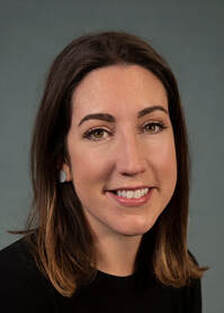
Abstract
Cystic fibrosis is a fatal genetic disorder, where patients are predisposed to lifelong lung infections. The most common cause of mortality in cystic fibrosis patients is chronic infection with Pseudomonas aeruginosa, an antibiotic-resistant, virulent pathogen that is virtually impossible to eradicate once established. There is currently no cure for cystic fibrosis, and it remains the most common fatal genetic disease in Europe.
Our understanding of cystic fibrosis has changed dramatically from considering Pseudomonas aeruginosa infections as simple, non-interacting cells within a sterile lung, towards our current understanding that infections are dynamic, variable, embedded within multi-species environments, and rapidly evolving. This raises questions such as:
- What makes an infecting microbe turn from “good” to “bad”?
- What constitutes a “healthy” lung microbiome in cystic fibrosis?
- How variable are Pseudomonas aeruginosa infections in terms of virulence?
- Can we manipulate the microbiome to resist invasion by harmful microbes?

Florey Institute Seminar Series (2018-19)
We are delighted to welcome Dr John Tregoning from Imperial Collage London who will give our next Florey Seminar.
Dr Tregoning has studied the immune responses to vaccination and respiratory infection for 15 years and has been an independent PI for 10 years. Based at the St Mary’s campus of Imperial College London, the Tregoning group’s research program is focussed on prevention of respiratory infections. This research has focused on vaccines to a range of respiratory pathogens. I have published over 50 articles in the area of immune responses to infection and vaccination. To achieve these aims, my group has developed a range of in vivo and in vitro models of infection and vaccination in early life, including RSV, Influenza, Pseudomonas aeruginosa, Staphylococcus aureus and non-typeable Haemophilus influenzae (ntHi). The research uses mechanistic studies in mice to identify correlates of protection that can be tested in human infection studies which in turn inform pre-clinical vaccine development studies.
We are delighted to welcome Dr John Tregoning from Imperial Collage London who will give our next Florey Seminar.
Dr Tregoning has studied the immune responses to vaccination and respiratory infection for 15 years and has been an independent PI for 10 years. Based at the St Mary’s campus of Imperial College London, the Tregoning group’s research program is focussed on prevention of respiratory infections. This research has focused on vaccines to a range of respiratory pathogens. I have published over 50 articles in the area of immune responses to infection and vaccination. To achieve these aims, my group has developed a range of in vivo and in vitro models of infection and vaccination in early life, including RSV, Influenza, Pseudomonas aeruginosa, Staphylococcus aureus and non-typeable Haemophilus influenzae (ntHi). The research uses mechanistic studies in mice to identify correlates of protection that can be tested in human infection studies which in turn inform pre-clinical vaccine development studies.
|
Speaker
Title Date Time Venue |
Dr John Tregoning
What prevents airway infection? Tuesday 23rd April 2019 1:00 pm F2, Firth Court |
Dr Tregoning tweets under the handle: @DrTregoning
|
British Science Week 2019!
Once again at the Florey Institute , we will be celebrating British Science Week with a series of blog posts over the next 10 days highlighting some of the exciting work that we do. Inspired by the work of Sir Howard Florey, the main aim of the Florey Institute is to investigate infectious disease and antibiotic resistance by looking at the interaction between pathogens and their hosts. This research is an interdisciplinary collaboration between scientists from across the University of Sheffield, with members from the MBB, APS, IICD, Chemistry and Physics departments as well as clinicians from the Sheffield teaching hospitals. Follow along here Follow the official hashtag on twitter at #BSW19 |
Florey Institute Seminar Series (2018-19)
We are delighted to welcome Dr Despoina Marvridou from Imperial Collage London who will give our next Florey Seminar.
Bio
Dr Despoina Mavridou has a chemistry background and after finishing her undergraduate studies at the University of Athens, proceeded to do a PhD in Biochemistry at the University of Oxford working with Stuart Ferguson and Christina Redfield. Her project involved structure-to-function studies of Escherichia coli DsbD, a central protein for disulfide bond formation in the periplasm of Gram-negative bacteria. After her PhD, Despoina remained in the same research lab as a postdoctoral research associate continuing her work on disulfide bond formation, while she also branched out to study cytochrome c maturation in E. coli. In 2014 she was awarded an MRC Career Development Award to start her own research group at the MRC Centre of Molecular Bacteriology and Infection (CMBI) at Imperial College London. Before starting her fellowship, she spent a year as a research fellow in the Department of Zoology in Oxford, as part of the research groups of Kevin Foster and Stuart West. Her work there focused on the contribution of collective behaviour in bacterial competition.
As an independent group leader Despoina is broadly interested in the biology of Gram-negative bacteria and more specifically in processes that occur in the extra-cytoplasmic environment. Her research approaches span from the fundamental to the applied and her lab currently focuses on three main research directions: 1) Understanding the involvement of disulfide bond formation in mechanisms of virulence of key Gram-negative bacterial pathogens, like Pseudomonas aeruginosa and Klebsiella pneumoniae; 2) Investigating whether proteins involved in disulfide bond formation could be potential targets for the treatment of antibiotic-resistant bacteria; 3) Studying the dynamics of bacterial communities and more specifically the competitive interactions between toxin-producing enteric strains encountered in the gut microbiota.
We are delighted to welcome Dr Despoina Marvridou from Imperial Collage London who will give our next Florey Seminar.
Bio
Dr Despoina Mavridou has a chemistry background and after finishing her undergraduate studies at the University of Athens, proceeded to do a PhD in Biochemistry at the University of Oxford working with Stuart Ferguson and Christina Redfield. Her project involved structure-to-function studies of Escherichia coli DsbD, a central protein for disulfide bond formation in the periplasm of Gram-negative bacteria. After her PhD, Despoina remained in the same research lab as a postdoctoral research associate continuing her work on disulfide bond formation, while she also branched out to study cytochrome c maturation in E. coli. In 2014 she was awarded an MRC Career Development Award to start her own research group at the MRC Centre of Molecular Bacteriology and Infection (CMBI) at Imperial College London. Before starting her fellowship, she spent a year as a research fellow in the Department of Zoology in Oxford, as part of the research groups of Kevin Foster and Stuart West. Her work there focused on the contribution of collective behaviour in bacterial competition.
As an independent group leader Despoina is broadly interested in the biology of Gram-negative bacteria and more specifically in processes that occur in the extra-cytoplasmic environment. Her research approaches span from the fundamental to the applied and her lab currently focuses on three main research directions: 1) Understanding the involvement of disulfide bond formation in mechanisms of virulence of key Gram-negative bacterial pathogens, like Pseudomonas aeruginosa and Klebsiella pneumoniae; 2) Investigating whether proteins involved in disulfide bond formation could be potential targets for the treatment of antibiotic-resistant bacteria; 3) Studying the dynamics of bacterial communities and more specifically the competitive interactions between toxin-producing enteric strains encountered in the gut microbiota.
|
Speaker
Title Date Time Venue |
Dr Despoina Mavridou
Disulfide bond formation underpins antimicrobial resistance in Enterobacteria Wednesday 6th February 2019 1:00 pm F2, Firth Court |
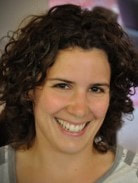
Abstract
The disulfide bond formation (DSB) system has a central role in protein homeostasis by folding hundreds of proteins in the cell envelope of Gram-negative bacteria. Whilst the importance of this pathway for bacterial virulence is well-established, its contribution to antimicrobial resistance is unknown. Here, we report that DSB proteins are necessary for the function of key antimicrobial resistance determinants. Resistance arising from the production of β-lactamases, mobile colistin resistance enzymes and RND efflux pumps in Enterobacteriaceae is dependent on DsbA. Moreover, chemical inhibition of disulfide bond formation leads to sensitization of multidrug-resistant clinical isolates to existing antibiotic compounds. This makes the DSB system a promising antimicrobial resistance target, potentiating the use of existing drugs for the treatment of enteric pathogens.
Professor Veening tweets under the handle: @BondSSbond
The disulfide bond formation (DSB) system has a central role in protein homeostasis by folding hundreds of proteins in the cell envelope of Gram-negative bacteria. Whilst the importance of this pathway for bacterial virulence is well-established, its contribution to antimicrobial resistance is unknown. Here, we report that DSB proteins are necessary for the function of key antimicrobial resistance determinants. Resistance arising from the production of β-lactamases, mobile colistin resistance enzymes and RND efflux pumps in Enterobacteriaceae is dependent on DsbA. Moreover, chemical inhibition of disulfide bond formation leads to sensitization of multidrug-resistant clinical isolates to existing antibiotic compounds. This makes the DSB system a promising antimicrobial resistance target, potentiating the use of existing drugs for the treatment of enteric pathogens.
Professor Veening tweets under the handle: @BondSSbond
2018
Florey Institute Seminar Series (2018-19)
Our first seminar speaker this year is Prof. Jan-Willem Veening from the University of Lausanne, Switzerland. The Veening lab uses systems and synthetic biology approaches to study chromosome segregation, mechanisms of antibiotic resistance development, and noise in gene expression in the important opportunistic human pathogen Streptococcus pneumoniae.
Our first seminar speaker this year is Prof. Jan-Willem Veening from the University of Lausanne, Switzerland. The Veening lab uses systems and synthetic biology approaches to study chromosome segregation, mechanisms of antibiotic resistance development, and noise in gene expression in the important opportunistic human pathogen Streptococcus pneumoniae.
|
Speaker
Title Date Time Venue |
Prof. Jan-Willem Veening
Coordination of DNA Replication with Cell Division in Streptococcus pneumoniae Tuesday 20th November 2018 1:00 pm F2, Firth Court |
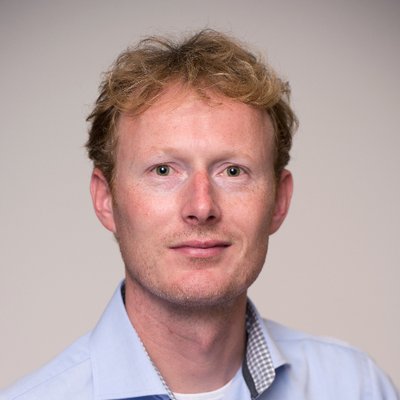
Prof. Veening obtained his Ph.D. from the University of Groningen, the Netherlands, and received postdoctoral training at the Centre for Bacterial Cell Biology, Newcastle University, UK. In 2009, he established his own research and teaching group in the Groningen Biomolecular Sciences and Biotechnology Institute at the University of Groningen. In 2016, he moved to the University of Lausanne as full professor at the Department of Fundamental Microbiology.
Professor Veening tweets under the handle: @JWVeening
|
The Florey Institute's
5th Annual Postgraduate Symposium The Hidden Army: Integrated approaches to fight infection 22nd June 2018 Find out more here Follow on twitter at: #Florey 2018 |
|
British Science Week!
It's British Science Week! At the Florey Institute we will be celebrating this event by posting and tweeting about all exciting news, research and work going on at our Institutes. Follow along here Follow the official hashtag on twitter at #BSW18 |
Florey Institute Seminar Series (2017-18)
Matt Holden is a Professor of Bacterial Genomics in the School of Medicine at the University of St Andrews, and consultant with NHS National Services Scotland. Prof Holden runs a group focusing on experimental and translational genomics. He is the genomics lead on the SHAIPI consortium tackling nosocomial infections in Scotland, and lead on the HATUA consortium investigating the burden and drivers of antibacterial resistance in East Africa. His research interests include the evolution of antibiotic resistance and pathogen populations, and the epidemiology of nosocomial infections.
Matt Holden is a Professor of Bacterial Genomics in the School of Medicine at the University of St Andrews, and consultant with NHS National Services Scotland. Prof Holden runs a group focusing on experimental and translational genomics. He is the genomics lead on the SHAIPI consortium tackling nosocomial infections in Scotland, and lead on the HATUA consortium investigating the burden and drivers of antibacterial resistance in East Africa. His research interests include the evolution of antibiotic resistance and pathogen populations, and the epidemiology of nosocomial infections.
|
Speaker
Title Date Time Venue |
Prof. Matthew Holden
Staphylococcal secrets of success: genomic perspectives of the rise of MRSA Tuesday 3rd July 2018 1:30 pm F2, Firth Court |
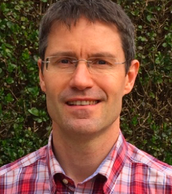
The widespread use of antibiotics, in association with high-density clinical care, has driven the emergence of multi drug-resistant pathogens that are adapted to survive and thrive in hospitalised patients and healthcare settings. Of particular concern are Methicillin-resistant Staphylococcus aureus (MRSA). Using whole genome sequencing we have been able build a picture of the evolutionary events that have shaped the genomes of successful hospital-associated MRSA clones, and trace their spread from the global level, right down to the patient level on a ward. In this talk I will focus on some of the most successful pandemic MRSA clones and illustrate how genomics has been used to gain a greater understanding of the epidemiology of disease, and what has driven the success of MRSA.
Professor Holden tweets under the handle: @mtgholden
Florey Institute Seminar Series (2017-18)
Prof. Martin Llewelyn from the Brighton & Sussex Medical School and Consultant in Infectious Diseases at Brighton & Sussex University Hospitals NHS Trust will be giving our next Florey seminar on Tuesday 1st May at 1:30 pm. Everyone is very welcome.
Prof. Martin Llewelyn from the Brighton & Sussex Medical School and Consultant in Infectious Diseases at Brighton & Sussex University Hospitals NHS Trust will be giving our next Florey seminar on Tuesday 1st May at 1:30 pm. Everyone is very welcome.
|
Speaker
Title Date Time Venue |
Prof Martin Llewelyn
Stopping sooner: a safe way to reduce antibiotic overuse in hospitalised patients? Tuesday 1st May 2018 1:30 pm LT6, Hick’s Building |

Antibiotic overprescribing is driving antibiotic resistance in the NHS. Hospital doctors are told to ‘Start Smart then Focus’ but in reality the vast majority of antibiotic prescriptions started in hospital are continued to complete a ‘course’. Lack of evidence, lack of knowledge, prescriber behaviour and patient perceptions result in a ‘continue unless stop is justified’ approach. In my talk, I will present the work of the Antibiotic Review Kit (ARK) - Hospital project which aims to safely reduce antibiotic overuse by supporting a ‘stop of justify continue’ approach to antibiotic prescribing
Professor Llewelyn tweets under the handle: @MartinLlewelyn
Florey Institute - Special Guest Lecture
Dr Mark Collery from Micropathoglogy will be giving a special invited talk to our Florey cohort on Wednesday 30th May 2018 at 2 pm. Everyone is very welcome.
Dr Mark Collery from Micropathoglogy will be giving a special invited talk to our Florey cohort on Wednesday 30th May 2018 at 2 pm. Everyone is very welcome.
|
Speaker
Title Date Time Venue |
Mark Collery
Micropathology and Me Wednesday 30th May 2018 2 pm G2, Firth Court |
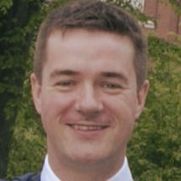
Dr Collery will hold a special guest talk to our institute to his experience working in clinical diagnostics at our ‘FIRF’ cohort meeting on Wednesday 30th May. Mark works for Micropathoglogy who are a company specialising in Pathogen Detection, PCR and DNA Sequencing (@Micropathology). He will share his insight into the challenges faced by clinical diagnostics in the UK and his career experiences working within this sector.
Dr Collery tweets under the handle: @ColleryMM
Florey Institute Seminar Series (2017-18)
Professor Willem van Schaik from the University of Birmingham will be giving our the Florey seminar on Friday 23rd March , at 1 pm. Everyone is very welcome.
Professor Willem van Schaik from the University of Birmingham will be giving our the Florey seminar on Friday 23rd March , at 1 pm. Everyone is very welcome.
|
Speaker
Title Date Time Venue |
Willem van Schaik
Antibiotic resistance and the human microbiome Friday 23rd March 2018 1 pm F2, Firth Court |
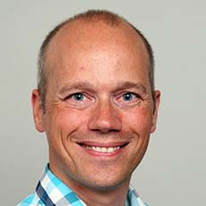
Willem van Schaik is Professor of Microbiology and Infection in the Institute of Microbiology and Infection of the University of Birmingham. Professor Van Schaik obtained his PhD degree in microbiology from Wageningen University in the Netherlands. He then did post-doctoral studies on an EMBO Long-Term Fellowship at the Pasteur Institute (Paris, France). He then moved to the University Medical Center Utrecht in the Netherlands, where he set up his own research group on antibiotic resistance in 2010. Prof Van Schaik moved to the University of Birmingham in April 2017. He has received major grants from The Netherlands Organisation for Scientific Research, the Seventh Framework Programme of the European Commission, the Joint Programming Initiative on Antimicrobial Resistance (JPIAMR) and The Royal Society. He was awarded a Royal Society Research Merit Award in 2017.
The research group of Professor van Schaik combines experimental tools in molecular biology and biochemistry with the opportunities offered by the development of novel, high-throughput DNA sequencing technologies and bioinformatics to elucidate the mechanisms by which harmless commensals transition into multi-drug resistant opportunistic pathogens. In addition, he studies the role of complex microbial ecosystems, in particular the human gut microbiome, as reservoirs of antibiotic resistance genes (‘the resistome’).
Dr van Schaik tweets under the handle: @WvSchaik
Florey Institute Seminar Series (2017-18)
Dr Elizabeth Ballou from the University of Birmingham will be giving our the Florey seminar on Wednesday 7th March, at 1 pm. Everyone is very welcome.
Dr Elizabeth Ballou from the University of Birmingham will be giving our the Florey seminar on Wednesday 7th March, at 1 pm. Everyone is very welcome.
|
Speaker
Title Date Time Venue |
Dr Elizabeth Ballou
Inducible aneuploidy drives Cryptococcus neoformans pathogenesis Wednesday 7th March 2018 1 pm F2, Firth Court |
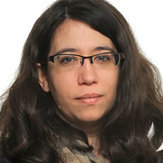
Elizabeth's group studies the interaction of microbes with the immune system, with a particular interest in the evasion of the host immune response.
Liz studied organic chemistry at Mount Holyoke College in the US before moving to the London School of Hygiene and Tropical Medicine to study Molecular Biology in the context of infectious diseases. She obtained her PhD in Genetics and Genomics from Duke University where she studied the morphogenesis of the fungal pathogen Cryptococcus neoformans. In 2012 she moved to the Aberdeen Fungal Group at the University of Aberdeen and in 2015, she was awarded a prestigious BBSRC Anniversary Future Leaders Fellowship to establish her research group as part of the MRC Centre for Medical Mycology. In 2017, Liz moved to the Institute Microbiology and Infection at the University of Birmingham.
Dr Ballou tweets under the handle: @BallouLab
Florey Institute Seminar Series (2017-18)
Dr Carlos Reding-Roman from the University of Exeter will be giving our next Florey seminar on Thursday 1st March, at 3 pm. Everyone is very welcome.
Dr Carlos Reding-Roman from the University of Exeter will be giving our next Florey seminar on Thursday 1st March, at 3 pm. Everyone is very welcome.
|
Speaker
Title Date Time Venue |
Carlos Reding-Roman
From rapid evolution to dose modulation: evolutionary challenges in clinical microbiology Thursday 1st March 2018 3 pm F2, Firth Court |

Carlos is currently an Associate Research Fellow in the Beardmore's Lab at the University of Exeter where he studies environmental factors that permit the evolution of antibiotic resistance by combining mathematical biology, microbial ecology and evolutionary biology.
Carlos tweets under the handle: @rc_reding
Florey Institute Seminar Series (2017-18)
Dr Julia Greig from the University of Sheffield will be giving our next Florey seminar in the series by presenting her work on Tuesday 6th February, at 1pm. Everyone is very welcome.
Dr Julia Greig from the University of Sheffield will be giving our next Florey seminar in the series by presenting her work on Tuesday 6th February, at 1pm. Everyone is very welcome.
|
Speaker
Title Date Time Venue |
Julia Greig
Staphylococcus aureus Bacteraemia and the results of the ARREST trial Tuesday 6th February 2018 1pm LT3, Medical School |
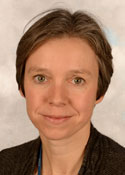
"S. aureus is a common cause of severe community acquired and hospital acquired infection worldwide. Despite the associated mortality from this blood stream infection of nearly 20%, the optimal antibiotic treatment is uncertain and most treatment recommendations are based on observational studies and clinical experience. The ARREST study tested the hypothesis that adjunctive rifampicin would enhance early killing of S. aureus and reduce treatment failure or disease recurrence or death.
This large, multicentre, randomised, double-blind, placebo controlled clinical trial recruited adults from 29 UK hospitals with S. aureus bacteraemia. They were treated standard antibiotics with either additional rifampicin or placebo. The primary outcome was time to bacteriologically confirmed treatment failure, or recurrence or death from randomisation to 12 weeks.
I will discuss our experiences of running a clinical trial involving acutely ill patients in Sheffield and the results of the ARREST trial, including the implications for the management of patients with this serious infection."
2017
Florey Institute Seminar Series (2017-18)
We are delighted to announce the first seminar in our 2017-18 seminar series.
We are delighted to announce the first seminar in our 2017-18 seminar series.
|
Date
Time Venue Speaker Title |
Tuesday 07 November 2017
1pm F2, Firth Court Dr Andrew Edwards, Imperial College London Staphylococcus aureus and the art of compromise |
Bio: I am a lecturer in the MRC Centre for Molecular Bacteriology and Infection and my research focuses on determining the molecular basis of persistent infection in Gram-positive bacterial pathogens. In this talk I will describe how S. aureus adapts to the host environment by acquiring mutations that shut down fast growth and/or toxin production, which enable it to survive immune attack and evade antibiotic therapy. I will also explain how our understanding of these processes has identified new therapeutic targets to prevent or eradicate persistent staphylococcal infections.
Charity Bake Sale for World Antibiotic Awareness Week
On 16th November, Florey PhD students will be marking World Antibiotic Awareness Week with a bake sale in Sheffields' Royal Hallamshire Hospital. Come try our infectiously good cakes, all in aid of the Sheffield Teaching Hospital.
On 16th November, Florey PhD students will be marking World Antibiotic Awareness Week with a bake sale in Sheffields' Royal Hallamshire Hospital. Come try our infectiously good cakes, all in aid of the Sheffield Teaching Hospital.
|
Date
Time Venue |
Thursday 16 November 2017
1-3pm Main entrance of Royal Hallamshire Hospital |
We'd love you to contribute some homemade cakes or biscuits for our stall - be they 'superbug' themed or just very scrummy! If you would like to donate, please let us know by completing the short form below and we can send you more details.
|
The theme of this years' event is "Think twice, seek advice" reminding people to never take antibiotics without first consulting a qualified healthcare professional. At this time of year, when everyone is full of a cold and wait times to see a GP are long, it can be more tempting than ever to take left over antibiotics. However, in the case of a cold, taking antibiotics will have no effect on the virus causing the infection and may cause unwanted side effects. The best thing you can do is give yourself time to get plenty of rest and consult a doctor if your symptoms persist. |
The Drugs Don't Work |
Thank you to everyone who joined us for our launch event (#TDDW).
|
2016

